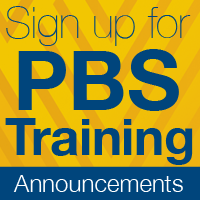
Spring 2018
What is the Motivation?
Download the PDF Version of the Spring 2018 Support Report
When teaching new replacement behaviors (to take the place of challenging behaviors) or other positive skills, it is critical to know what best motivates someone to learn.
Whether something is reinforcing depends on the individual…
The same type of interaction, event or object can appeal very differently to different people.
- Food preferences can dramatically influence how hard someone will work for food-based rewards.
- Social attention might be highly preferred by one person, but overwhelming or undesired by another.
- Activities or items may or may not appeal to an individual’s preferences and interests.
Examples like these are only considered reinforcers when they increase the future likelihood of the behaviors they follow.
What is reinforcing for behavior at one time may not be at another…
Even when used with the same person, the power of a reinforcer is subject to change, much like the value of money, depending on where and when it is spent.
- The appeal of food can vary based on how full we are, how active we have been, or if we are feeling sick.
- Strong parental attention can be much more motivating for a young child than an adolescent.
- Activities or items can break, become outdated or someone just might grow bored of them.
Just because something works well, does not mean it is the only thing that will motivate…
If only one or a few reinforcers are used, they can lose their effectiveness to motivate.
- Include a mixture of things for the individual to choose from.
- Regularly introduce new options as choices to promote choice-making and variety-building.
- Limit use of certain reinforcers to important tasks to keep them special.
Make sure that desired behaviors do not go too long without reinforcement…
Provide reinforcement consistently, immediately following desired behavior.
- Minimize delay so the learner clearly relates their behavior with the reinforcer.
- Provide frequent, dependable reinforcement for smaller, positive actions and build on those successes.
- Build the number of reinforcing experiences in someone’s life, so they regularly feel motivated.
Reinforcement is often mislabeled as a form of "bribery." However, everyone requires unique incentives for the things they do, particularly when such things are new, different or difficult for them.
Upcoming trainings:
Creative Facilitation: Using the MAPs process in Wraparound
May 1 - Charleston
Systems of Reinforcement: How to motivate to the maximum
May 10 - Morgantown and Charleston
Purpose of the Positive Behavior Support (PBS) project
The purpose of the PBS project is to build the state’s workforce and community capacity to support individuals with developmental and intellectual disabilities, traumatic brain injuries and co-existing disorders relating to the prevention and treatment of challenging behaviors and improving quality of life. Through training and consultation, we promote supportive, motivating and inclusive environments for individuals with complex needs.
What is PBS?
PBS is an approach for teaching new skills to replace challenging behaviors and redesigning the environment to enhance quality of life. PBS operates from a personcentered values base, allowing the participant to guide team decisions about their lives. This approach is positive, proactive and focuses on preventing challenging behaviors before they occur.
Overview of project activities
The following project activities can help you improve challenging behaviors:
Training and continuing education opportunities
- A variety of trainings for professionals
- Social work CEU's
Technical assistance and mentoring
- Guidance and feedback to professionals
- Solutions for challenging behaviors
Person-centered planning
- Develop personal goals
- Create an action plan for achieving goals
Short-term individual assistance
- Serve a very limited number of individuals and families statewide
- Individuals must have dangerous behaviors and no services in place to address them
To learn more about the PBS project, register for a training or subscribe to our quarterly Support Report newsletter, please visit pbs.cedwvu.org. Questions? Topic suggestions? Phone: 855-558-4296 Email: pbs@hsc.wvu.edu
The Positive Behavior Support Project is funded through a grant with the West Virginia Department of Health and Human Resources, Bureau for Behavioral Health and Health Facilities.

